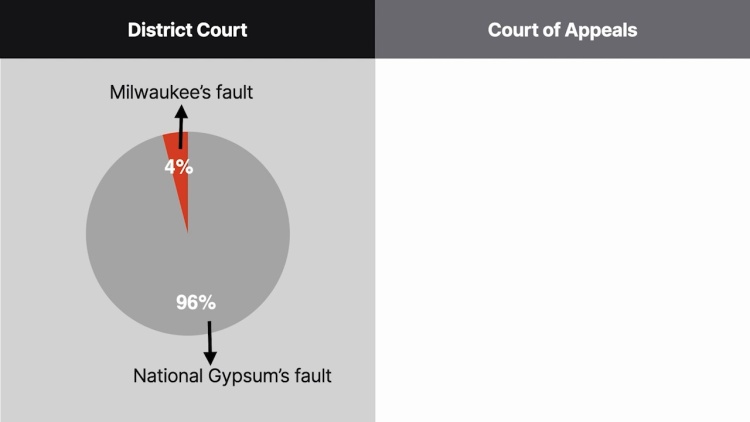City of Milwaukee v. Cement Division of National Gypsum Company
United States Supreme Court
515 U.S. 189 (1995)

- Written by Josh Lee, JD
Facts
The Cement Division of National Gypsum Company (National Gypsum) (plaintiff) owned and insured the E.M. Ford (Ford), a ship. The Ford was berthed in a slip owned by the City of Milwaukee (City) (defendant) in the outer harbor of the City. During a severe winter storm, the Ford broke loose from its moorings and battered against the headwall of the slip. National Gypsum brought suit against the City in federal district court under admiralty and maritime jurisdiction, alleging that the City had negligently assigned the Ford to an unsafe slip. The City alleged that National Gypsum had negligently left its ship unmanned in the winter with no means of monitoring weather or summoning help. The district court held that National Gypsum was 96 percent responsible for the damage and that the City was 4 percent responsible. Under this allocation, each party would essentially bear its own losses. National Gypsum appealed. The United States Court of Appeals for the Seventh Circuit affirmed in part, but found that two-thirds of the responsibility was National Gypsum’s and one-third was the City’s. Subsequently, the parties entered into a partial settlement of approximately $1.67 million, which excluded prejudgment interest and provided that any claim for prejudgment interest would be submitted to the district court. National Gypsum then sought prejudgment interest of over $5.3 million. The district court denied prejudgment interest, holding that while prejudgment interest was generally available in admiralty cases outside special circumstances, National Gypsum’s contributory negligence was of such magnitude that prejudgment interest would be inequitable. National Gypsum appealed. The court of appeals reversed, holding that prejudgment interest was available in admiralty cases regardless of contributory negligence. The City appealed to the United States Supreme Court, arguing that prejudgment interest was inequitable due to the special circumstances of the City’s good faith in filing suit and National Gypsum’s contributory negligence.
Rule of Law
Issue
Holding and Reasoning (Stevens, J.)
What to do next…
Here's why 911,000 law students have relied on our case briefs:
- Written by law professors and practitioners, not other law students. 47,100 briefs, keyed to 997 casebooks. Top-notch customer support.
- The right amount of information, includes the facts, issues, rule of law, holding and reasoning, and any concurrences and dissents.
- Access in your classes, works on your mobile and tablet. Massive library of related video lessons and high quality multiple-choice questions.
- Easy to use, uniform format for every case brief. Written in plain English, not in legalese. Our briefs summarize and simplify; they don’t just repeat the court’s language.






